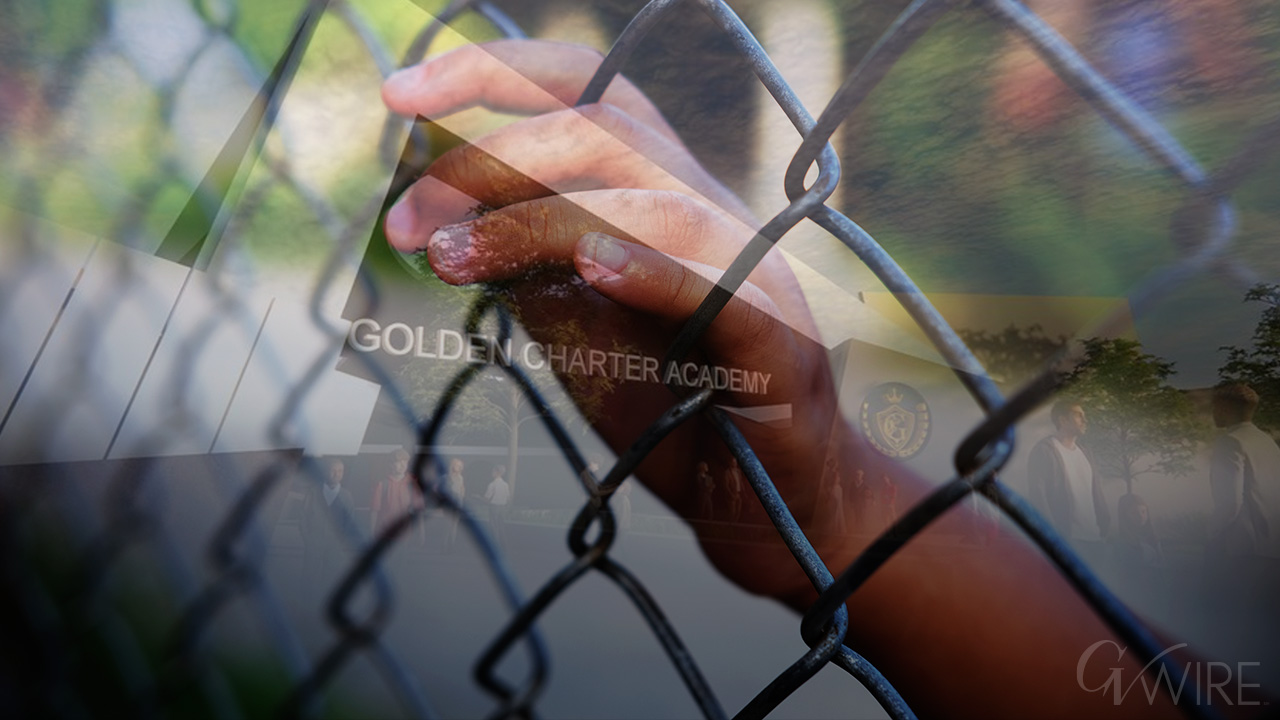Golden Charter Academy emphasizes restorative practices, promising to throw out punitive measures, but former parents say it's "incarcerating" Black and Brown children. (GV Wire Composite)

- Parents of former Golden Charter Academy students went looking for an alternative education model but found a school with punitive discipline enacted by "plainclothes police officers."
- The charter school, which serves a predominantly Black student body, promises restorative practices, but parents compare it to juvenile hall.
- Fresno Unified is addressing multiple concerns with Golden Charter, aligning with complaints parents filed months ago.
Share
|
Getting your Trinity Audio player ready...
|
Kristina Holmes-McIntyre turned to Golden Charter Academy for environmental stewardship and culturally responsive education. Instead, she says she found a school with punitive and isolating disciplinary practices, and a staff who had more experience with criminal justice than education.
“I would describe the culture as that of an alternative behavior modification school,” Holmes-McIntyre said.
She has brought multiple formal complaints against the school, taking her allegations to the California Department of Education, social media, and the police.
In response, Golden Charter enlisted a legal team and threatened litigation if Holmes-McIntyre did not take down social media posts.
But Holmes-McIntyre, mother of two former GCA elementary “scholars,” isn’t backing down.
And she’s not the only upset parent.
Jennifer Kelley and Mike Washington also withdrew their son after facing similar issues.
“This was a bad experience for my child, a very bad experience,” Washington said. “It was an experience like I’ve never dealt with before. They have security on campus, running it like it’s a juvenile hall.”
Complaints Filed Against the School
In April, Holmes-McIntyre filed a Uniform Complaint Procedure with the school. In it, she expressed concerns about lack of access to student records, disciplinary measures, retaliation by staff, and unqualified staff.
She further asserted that personnel had her 10-year-old son, Prince, sign an “agreement” separating himself from a friend without her consent and restricted his access to recess — practices that left the boy socially isolated and physically pent up, Holmes-McIntyre said.
These complaints hit dead ends until recently. Fresno Unified School District, the charter overseer, reiterated all of Holmes-McIntyre’s concerns and is now working to correct the issues.
“If the concern is ongoing and requires additional support, we will consult with our staff and if needed, legal counsel,” district spokesperson Diana Diaz said.
GCA spokesperson Tiffany Cummins declined to comment about the parent complaints, saying only that GCA CEO Robert Golden was “a great man doing great things in the community.”
She also provided written clarifications about the academy’s general practices.
Golden Charter’s Vision and Mission
GCA, which Fresno Unified trustees approved for a five-year charter in 2021 on a 4-2 vote, focuses on promoting equity, primarily teaching underserved communities in southwest Fresno.
It is building a new $26 million campus across the street from the Fresno Chaffee Zoo and receives about $8.3 million annually from the Local Control Funding Formula and state, local, and federal funding.
Related Story: Fresno Board OK’s ‘Disneyland of Schools’ Charter Despite ...
The charter has a 96.9% minority enrollment, serving a predominantly Black student body, and 88% of students are economically disadvantaged, according to U.S. News.
“I wanted (Prince) to experience a school where Black and Brown students see themselves reflected in leadership, not just in support roles, but in decision-making positions,” Holmes-McIntyre said.
The school’s charter petition promised restorative practices. This attracted parents of Black and Brown students who historically make up the preponderance of school suspensions and expulsions in Fresno Unified and other California public school districts.
“Keep in mind that GCA does not suspend or expel Scholars for willful defiance or disruption of school activities, but rather we utilize our restorative justice and progressive discipline practices,” Cummins said.
In 2023, GCA had high suspension rates, appearing in the red. Then, in a complete 180, GCA’s suspension rates went green in 2024.
Now, the school relies on “stay away orders” that prohibit specified students from interacting and “loss of privilege contracts” that strip students of access to all play equipment and other privileges, parents say.
Holmes-McIntyre believes that CGA implemented the stay-away and loss-of-privileges strategies to make the school look better even though students still receive “punitive punishments.”
Chronic absenteeism and student scores also improved alongside the decrease in suspensions.

Charter Could End After Next School Year
The Fresno Unified School Board, which oversees GCA, will have the option to renew the charter after the 2026-27 school year. In the past, trustees have been split.
And now, the district is addressing a long list of issues with GCA.
After Holmes-McIntyre addressed the board in a public meeting, trustees directed the district to look further into Holmes-McIntyre’s concerns, according to Trustee Veva Islas.
“Review of that (UCP) report did raise several areas of concern regarding GCA’s operations,” Board President Valerie Davis said in an email to Holmes-McIntyre. “The district will make clear to GCA its obligations and the district’s expectations that it modifies its practices as necessary to comply with the law and GCA’s charter.”
The “areas of concern” listed matched Holmes-McIntyre’s grievances to a tee — acknowledging inconsistencies with the law, charter, and best practices.
But Holmes-McIntyre, who believes the district initially failed in its oversight duties, is pushing for more than acknowledgement and private conversations.
“FUSD is requiring GCA to respond and remediate, but does not commit to any public action, corrective plan, or accountability measures,” Holmes-McIntyre said.
Islas, who said the board needs to be careful with all of the charters they authorize, did not share if she was against the renewal. Instead, she pointed to her voting history on GCA: A long list of nays.
Trustees Elizabeth Jonasson-Rosas and Keshia Thomas, a founding member of GCA and the mother-in-law of the school’s CEO Robert Golden, declined to comment.
Related Story: Fresno Trustee Slams Board Over Review of Son-in-Law’s Charter School
Calls to all other trustees were not returned.
Complaints Say Golden Charter’s Practices Counter Its Promise
Former GCA parents Holmes-McIntyre, Washington, and Kelley, describe the campus not as a welcome refuge but as prison-like, imposing constant surveillance on pupils.
The school monitors student activity, ensuring that staff always escorts pupils, even to the bathroom, parents said.
This close monitoring, done physically and through cameras, contradicts the mission of the Academy, according to Holmes-McIntyre.
However, GCA asserted that its staff does not escort students through campus.
“We ensure active supervision by staff during all transitions, recess, lunch, and other activities to maintain safety and structure,” Cummins said.
And, as Holmes-McIntyre continued to raise concerns about discipline and the juvenile hall-like atmosphere, personnel made multiple comments about “helping” her move her children, she said.
“We are more than willing to support you in exploring alternative educational options that may be a better fit for your family,” Robert Golden wrote in an email to her.
Holmes-McIntyre says that while Golden framed these comments as supportive, they are retaliatory. And although her children are no longer at GCA, she is pursuing her complaints because she says GCA is not a safe or lawful environment for children.
“GCA may be small, but its practices raise big questions about public accountability, civil rights, and the future of charter schools in Fresno. If this school was truly founded to serve and uplift marginalized youth, its practices should reflect that mission, not undermine it,” she said.
Holmes-McIntyre Files Charges Over Investigation
Holmes-McIntyre has requested that the Fresno County Public Integrity Unit investigate “willful obstruction, systemic collusion, and misuse of public authority” by GCA and Fresno Unified.
This escalation came after two investigations by GCA and a third-party investigator into her claims concluded with no reported findings of improper conduct.
Initially, GCA filed her UCP request under a general complaint — conducting an internal investigation without direct communication with or follow-up questions for Holmes-McIntyre, she said.
A UCP is a formal complaint, requiring specific procedures, while a general complaint allows the school more leeway. Holmes-McIntyre believes the school attempted to avoid accountability by not filing her complaint properly.
After the investigation concluded in May, Holmes-McIntyre refiled the complaint, adding concerns about the internal investigation process.
But a new third-party investigator, Craig Hinch, never received that initial investigation. GCA chose not to provide Hinch with those documents — saying it might influence Hinch’s investigation, according to the UCP report.
Holmes-McIntyre labeled this withholding a “willful obstruction” of the investigation.
After these dead ends, Holmes-McIntyre took her complaint to the California Department of Education where she hit another roadblock.
“The California Department of Education (CDE) does not have jurisdiction under the UCP process to consider your request,” the CDE said in a statement to Holmes-McIntyre, passing the issue back to local agencies.
“This is why the district makes you file a complaint with the CDE. Because they only investigate a very narrow scope of complaints,” Holmes-McIntyre said.
Investigator Records Holmes-McIntyre Without Her Knowledge
Holmes-McIntyre has also filed a civil complaint against investigator Hinch for allegedly recording phone calls with her without her knowledge or consent.
However, GCA Board President Ed Gonzalez sent the recordings to Holmes-McIntyre alongside all other investigation interviews. She described the receipt of the recording as either an accident or an act of God.
“You hear them talking about me as a mother with all the stereotypical windows that you talk about Black mothers: how I’m uninvolved, unengaged, that I don’t discipline my children,” Holmes-McIntyre said.
Additionally, before the investigation began, she questioned the qualifications of Hinch, who has no mention of experience with education code on his website. Prior to this, he worked for California Highway Patrol.
Despite Holmes-McIntyre’s complaints, GCA did not appoint a new investigator.
Hinch has conducted multiple other investigations for Fresno Unified — another point of concern for Holmes-McIntyre, who feels he has financial ties to the district.
Staff Admit Not Having Required Qualifications
Former parents also are concerned about the qualifications of other GCA personnel. Specifically: “Behavioral technicians” assessing students and developing intervention plans, have experience in law enforcement rather than psychology or education.
GCA requires technicians to have a bachelor’s degree in psychology, education, or a “related field” and prefer if they have certification as a Board-Certified Behavior Analyst, Cummins said.
During the UCP investigation, all of the involved behavioral technicians said they did not hold a BA in these fields. Additionally, no one held the preferred certification.
The school only required the technicians to complete a 40-hour training course developed by the Human Resources department, according to the report.
One involved behavior technician, Tiffany Quarles, had experience in the juvenile justice system. The Dean of Students, David Watson, who is at the center of student discipline, also has a past in law enforcement.
“Why are most of the staff ex-police officers? Why do so many of the staff have backgrounds in the juvenile justice system,” Holmes-McIntyre questioned. “The fact of the matter is (Golden) filled Golden Charter with plainclothes police officers and people with backgrounds in the juvenile justice system, creating a system at Golden Charter Academy that has incarcerated and detained ten-year-olds!”
Golden Charter Limits Student Recess for Months
GCA staff’s prominent background in criminal justice shines through their handling of student discipline, according to Holmes-McIntyre.
Her son lost “privileges” and was placed on a 30-day contract one month after enrolling at GCA. Shortly after, the school extended this to 90 days, relegating him to walking around or sitting on benches at recess, Holmes-McIntyre said.
The boy became socially isolated and restless, unable to participate in activities involving play equipment.
Senate Bill 291, commenced in the 2024-25 school year, requires local educational agencies to grant students at least 30 minutes of recess on regular instruction days.
Cummins denied the use of loss-of-privilege contracts, but in the UCP report, personnel confirmed the use of these disciplinary practices.
Another parent, Jennifer Kelley, told GV Wire that GCA continuously extended her child’s LOP, lasting most of the year.
“It’s just getting extended, extended, extended to the point where (the school) just stopped saying it. It is just my son is still on Loss of Privilege,” Kelley said. “And ‘mom, we let him off because he’s been on it for so long. We’re just going to try to give them another chance.’ But the next day, he’s right back on it for something. And I just got to the point where I was like ‘I can’t deal.’ ”
At one point, the pupil received an LOP extension for standing next to another student who was shaking the gate, Kelley and Washington said.
Disciplinary Measure Mimics Criminal Restraint: Holmes-McIntyre
Stay away orders are “preventive measures to minimize recurring conflict and ensure safety and emotional well-being,” according to Cummins. She dubbed them “informal mutual friendship breaks.”
However, Holmes-McIntyre described them much differently, comparing them to criminal restraining orders.
Prince allegedly signed a SAO without her knowledge or consent. The two students listed in the agreement were good friends and did not have any physical or verbal altercation to cause the stay away order, she said.
Later, Prince reportedly informed her that the school told the students they couldn’t interact due to being a bad influence on each other.
When she stated that she never consented to her child signing the contract, the office manager, Ashalynn James, allegedly responded, “We don’t need your consent.”
In the UCP report, school personnel acknowledged that SAOs did not include a parental signature at that time but now do.
There is no mention of LOPs or SAOs in the 2023-24 handbook, which remained on the website until this summer.
Holmes-McIntyre and Kelley were unaware of the disciplinary measures until GCA imposed them on their children.
The newly released 2025-26 parent handbook, details semi-similar discipline under new names.
Limited Access to Student Records
All families noted difficulty receiving student records from GCA.
GCA provides all records “that qualify as an educational record in accordance with (the Family Educational Rights Privacy Act),” Cummins said.
Kelley was unable to access her son’s records, she said. Both Kelley and Washington said that the school did not notify them of write-ups and that personnel often could not tell them about incidents.
Holmes-McIntyre was only able to see a portion of her child’s records — the school omitted any incident when another student was named, she said.
GCA uses a Google form system to track behavioral incidents, which are compiled into a spreadsheet amongst information about other students. The school does not share them due to privacy concerns, according to the UCP investigation.
“Whether they are handwritten, electronic, or internal, if they are being used to track, justify, or manage behavior, they are protected records,” said Holmes-McIntyre.
GCA does not consider student notes and write-ups as part of a student’s record, but the school cited them as justification for the LOPs.
When Holmes-McIntyre requested access to this information, the academy responded via email:
“You should be thankful that we’ve chosen to give Prince multiple chances and have not formalized every incident, as that leniency has helped protect his academic and behavioral record.”
RELATED TOPICS:
Categories

US and Uzbekistan Sign Critical Minerals Pact

Madera Police Seek Help Identifying Theft Suspect

Wall Street Ends Higher, Lifted by Nvidia and Other AI Stocks















